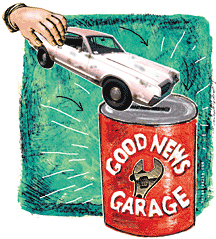
Hal Colston C’75 was working for a community-action agency in Vermont when one day, Debra, a welfare recipient with two kids, walked into his office in tears. “She had just bought a car for 500 bucks and couldn’t get it home,” he recalls. “It had no brakes. For two weeks I tried to help her get her money back. The idea popped in my head that we needed a community-based garage helping people where they are, like a community-health agency.”
Thanks to Colston’s inspiration, the Good News Garage, about 700 low-income clients in Vermont have a safe and reliable set of wheels to get to work. The five-year-old garage uses federal funds to re-condition used vehicles that have been donated to the program and then matches them up with needy owners.
“Seventy-five percent of recipients who get a car from us, who are on welfare, get a job,” says Colston, the program’s director. “Our program has really shaken the myths. Low-income people are demonized, but they don’t want to be poor.” The to in welfare to work, he adds, “is really all about transportation. If people can’t get there, it’s not going to happen. I think it’s the last hurdle that we’re just starting to deal with—the whole mobility issue.”
Colston studied electrical engineering at Penn before transferring to the College to become a geology major. He worked part-time in the restaurant business and got “sucked in” before he could finish his degree, eventually becoming a chef, restaurant manager, and an instructor at the New England Culinary Institute. During a mid-life crisis around age 40 he made “a radical switch” into social-services work for a community-action agency in Burlington. Affiliated with a Lutheran church, he eventually became involved with Lutheran Social Services of New England as it began to look for a project to develop in Vermont. “I helped do this survey [on community needs] and it came back in bold: transportation.”
“I had a one-page concept paper [about the garage] and I didn’t have the nerve to present it, because I thought they would laugh at me. It was like a Pentecostal moment. When the group heard the idea, the church was overwhelmed with excitement.”
The project began with a $35,000 budget and a staff consisting of Colston, a volunteer from the Americorps Vista program, and a mechanic. Today its budget totals $800,000 and there are a dozen people on the Good News Garage staff. The garage has also earned the backing of Tom and Ray Magliozzi, cohosts of the popular NPR radio show Car Talk. “They’re now honorary chairs of our capital campaign and they’ve been very generous with their time,” Colston says.
Good News Garage takes in the full gamut of American and foreign cars, with an average age of eight to 10 years. “Our best vehicles end up being Hondas and Toyotas. They’re reliable, easy to fix, and they can take the miles.” About five percent of the donations are luxury vehicles, like Mercedes and BMWs, which Colston’s garage turns around and sells on the market because the upkeep would be too expensive for his clients.
More than 400 communities around the country have contacted Colston to get information on the program, and the Good News Garage has already helped several start their own programs. It has developed a partnership with the Americorps Vista program, and Colston says he’d like to see “a real connection with the federal government. We’ve gotten some great HUD support and recognition.”
Meanwhile, the program has a waiting list of 300 clients. Fortunately the donations keep coming in. “I think that’s what people relate to: knowing that their car is going to transform someone’s life.”

